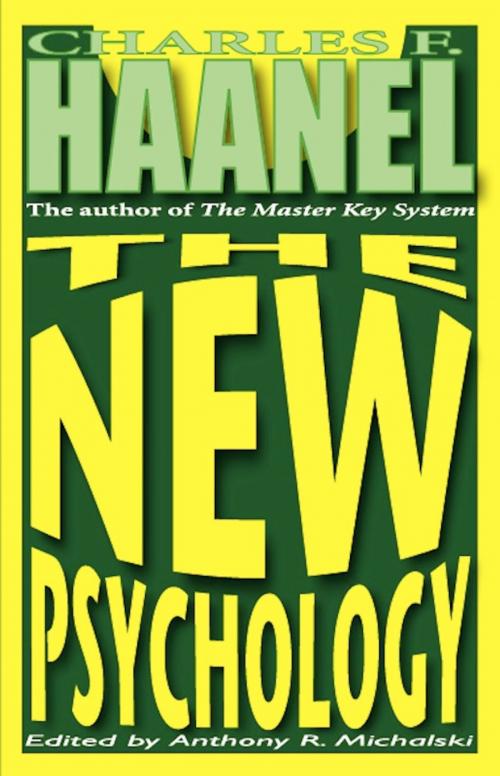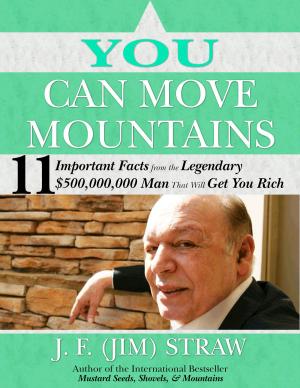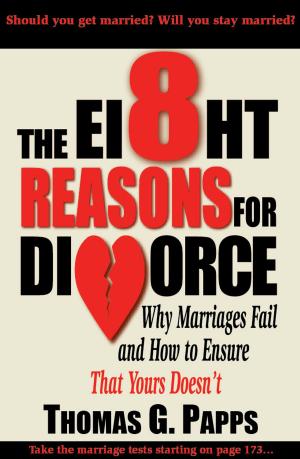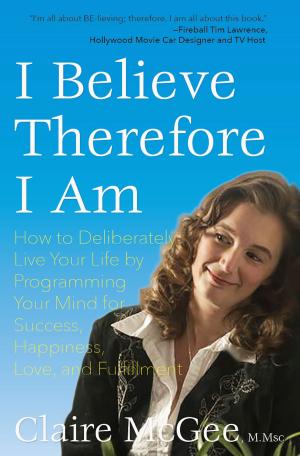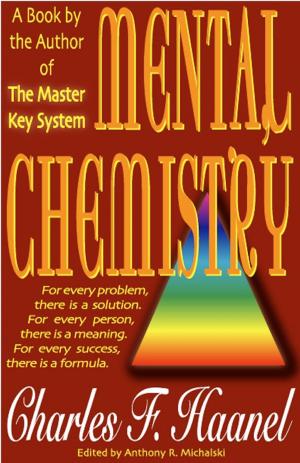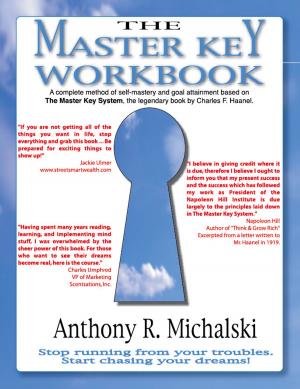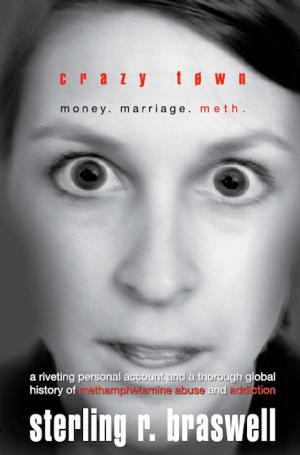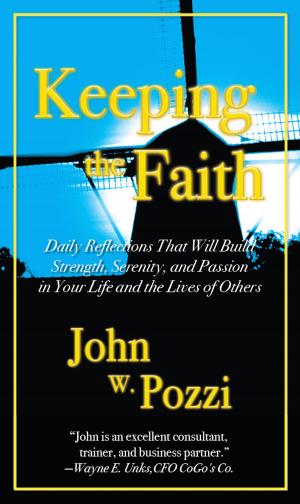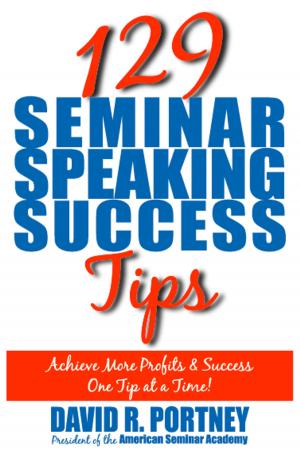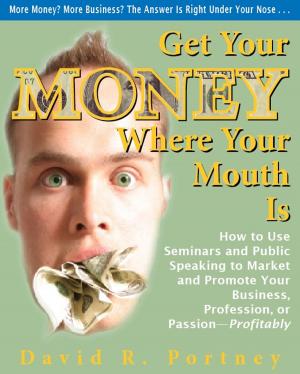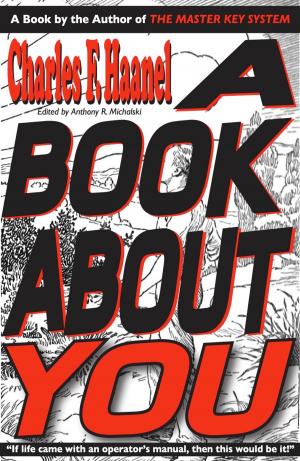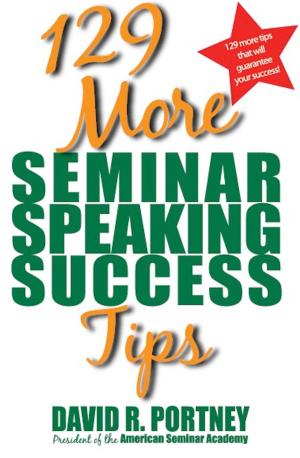The New Psychology
Nonfiction, Health & Well Being, Self Help, Self Improvement, Success, Motivational| Author: | Charles F. Haanel | ISBN: | 1230000143287 |
| Publisher: | Kallisti Publishing | Publication: | June 19, 2013 |
| Imprint: | Language: | English |
| Author: | Charles F. Haanel |
| ISBN: | 1230000143287 |
| Publisher: | Kallisti Publishing |
| Publication: | June 19, 2013 |
| Imprint: | |
| Language: | English |
In the way that only Haanel can do, Haanel defines man’s place in the Universe and reveals his latent powers with a vividness that reminds the reader of a lightening flash.
After you read The New Psychology, you’ll see everything a little differently…
The supreme charm of The New Psychology is the practical character of its teachings — the clarity and simplicity of its expression. Unlike many works that attempt to present psychical truths, it is not a tangled skein of disconnected thoughts, but an orderly, logical, and well-reasoned system. The New Psychology — with a synthesis of philosophy, science, metaphysics, and religion — defines man’s place in the universe and reveals his latent powers with a vividness that reminds the reader of a lightening flash.
The seeker for truth will find in its pages the keys to the treasure house of the world’s wisdom.
The New Psychology is quite different from Haanel’s other works. In The New Psychology, Haanel expands on the ideas and theories behind mental science and offers to you many examples and proofs that bolster the claims made.
While this work is almost one hundred years old, everything holds true to this day. I attempted to footnote things as extensively as possible. I am certain that when Haanel wrote this book, the people he mentioned were more than likely household names. James J. Hill, while almost unheard of today, was pretty much the “Bill Gates” of his time. I hope my footnotes help put things in perspective for you.
The New Psychology is a must for anyone who wants to understand the mental science. It is also a must for anyone who wants to thoroughly understand Haanel and his beliefs. Through his words, we can get a clearer picture of him — as a thinker, explorer, and perhaps even a visionary.
Here are just a few things that you will learn as you read Charles F. Haanel’s The New Psychology…
The Psychology of SuccessThe man with the money consciousness is constantly attracting money. The man with the poverty consciousness is constantly attracting poverty. Both fulfill the exact conditions — by thought, word, and deed – that make the path for the thing of which they are conscious, come to them. “As a man thinketh in his heart, so is he.” Job said, “The thing I greatly feared has come upon me.” In modern psychological language, it might better have been stated this way: “The thing I was greatly conscious of came upon me.” Consciousness, or thought and faith, are mental wires by which the thing we are conscious of finds its way to us.
The Law of Abundance
Abundance is a natural law of the universe. The evidence of this law is conclusive; we see it on every hand. Everywhere nature is lavish, wasteful, extravagant. Nowhere is economy observed in any created thing. The millions and millions of trees and flowers and plants and animals and the vast scheme of reproduction where the process of creating and re-creating is forever going on, all indicate the lavishness with which nature has made provision for man. That there is an abundance for everyone is evident; but that many seem to have been separated from this supply is also evident; they have not yet come into realization of the universality of all substance and that mind is the active principle which starts causes in motion whereby we are related to the things we desire.
The Master Mind“Great men or masters stand like solitary towers in the Eternal City. And secret passages running deep beneath external nature give their thoughts intercourse with high Intelligence, which strengthens and controls them. And of which the laborers on the surface do not even dream.”
The Master Mind is within your body and soul, yet interpenetrating both. It is the Grand Man – the God Man – of each of us. It is the same in all human beings and is what is familiarly called the “I AM.”
A Master is one who is not controlled or mastered by flesh, blood, the Devil, or others. He is not a subject, but a ruler. He knows, and he knows that he knows; because of this he is free and can be dominated by no one.
When you have reached the point where you are steadily mastering and overcoming and clothing your mind with more and more knowledge, you have your face toward the Light and are moving onward and upward.
Law becomes your servant and is no longer your master. You speak your thought or word accompanied with faith, will, and the proper mental picture, and your word accomplishes that whereunto it is sent. Or, in other words, the Creative Law hastens to fulfill your word.
The Law of Attraction
Attraction is the power that is sweeping through eternity, a living stream of relative action in which the basic principle is ever active. It embraces the past and carries it forward into the ever widening future; a movement where relative action, cause, and effect go hand in hand; where law dovetails into law; and where all laws are the ever willing handmaids of this great creative force.
The Universal Mind
The nervous system is matter. Its energy is mind. It is therefore the instrument of the Universal Mind. It is the link between matter and spirit – between our consciousness and the Cosmic Consciousness. It is the gateway of Infinite Power.
The Conscious MindAll the lost mines of Mexico, all the argosies that ever sailed from the Indies, all the gold and silver-laden ships of the treasure fleets stored in Spain count no more in value than a beggar’s dole compared to the wealth that is created every eight hours by modern business ideas.
Opportunity follows perception, action follows inspiration, growth follows knowledge, environment follows progress; always the mental first, then the transformation into the illimitable possibilities of character and achievement.
The progress of the United States is due to two percent of its population. In other words, all our railroads, all our telephones, our automobiles, our libraries, our newspapers, and a thousand other conveniences, comforts, and necessities are due to the creative genius of two percent of the population.
The Creative Process
If the chemist produces nothing of value, nothing which can be converted into cash, we are not interested. But, fortunately, the chemist in this case produces an article that has the highest cash value of any article known to man.
He provides the one thing which all the world demands, something which can be realized upon anywhere, at any time. It is not a slow asset; on the contrary, its value is recognized in every market. The product is thought; thought rules the world; thought rules every government, every bank, every industry, every person and every thing in existence, and is differentiated from everything else, simply and only because of thought.
Every person is what he is because of his method of thinking, and men and nations differ form each other only because they think differently.
VibrationBefore any environment, harmonious or otherwise, can be created, action of some kind is necessary, and before any action is possible, there must be thought of some kind, either conscious or unconscious, and as thought is a product of mind, it becomes evident that Mind is the creative center from which all activities proceed.
Causation
Universal intelligence leaves its source to become embodied in material forms through which it returns to its source. Mineral life animated by electromagnetism is the first step of intelligence upward, toward its universal source. Universal energy is intelligent and this involuntary process by which matter is built-up is an intelligent process of nature that has for its specific purpose the individualization of her intelligence.
Equilibrium
Nature is forever trying to bring about an equilibrium, and in accordance with this law we find constant action and reaction.
The concentration of matter implies the dissipation of motion; conversely, the absorption of motion implies the diffusion of matter.
This accounts for the entire cycle of changes passed through by every existence. Moreover, it applies to the entire cycle of each existence, as well as to each detail of its history. Both processes are going on at every instance; but always there is a differential result is favor of one or the other. And every change, even though it be only a transposition of parts, inevitably advances one of the factors.
PhysiologyOne of the most interesting features of the human system is its series of manufacturing plants in which are produced the chemical agents necessary to mobilize the constituents of food. And it is a part of the fine natural economy that the secretions containing these chemical agents should serve several other purposes also. In general, each may be said to have an alternative effect upon the others, or at least upon the activities of the other plants; also, they act upon the inward-bound nerve paths as exciters of effects in both the conscious and the subconscious activities.
The Psychology of Medicine
To the development of radio communication is largely due to the imagination of science and the dawning of an idea that a few years ago would have been considered revolutionary and subversive of all the established traditions of medicine.
“The psychical method has always played an important, though largely unrecognized, part in therapeutics. It is from faith, which buoys up the spirits, sets the blood flowing more freely, and the nerves playing their parts without disturbance, that a large part of all cures arise. Despondency or lack of faith will often sink the stoutest constitution almost to death’s door; faith will enable a bread pill or a spoonful of clear water to do almost miracles of healing, when the best medicines have been given over in despair. The basis of the entire profession of medicine is faith in the doctor and his drugs and his methods.”
Mental Chemistry
Chemistry is the science which treats of the intra-atomic or the intra-molecular changes that materials things undergo under various influences.
Mental is defined as “of or pertaining to the mind, including intellect, feeling, and will, or the entire rational nature.”
Science is knowledge gained and verified by exact observation and correct thinking.
Mental chemistry is, therefore, the science which treats of the changes that conditions undergo through the operation of the mind. As the transformations that are brought about in applied chemistry are the result of the orderly combination of materials, it follows that mental chemistry brings about results in a like manner.
Mental Medicine
In The Law of Mental Medicine, Thomas Jay Hudson says:
Like all laws of nature, the law of mental medicine is universal in its application; and, like all the others, it is simple and easily comprehended.
Granted that there is an intelligence that controls the functions of the body in health, it follows that it is the same power or energy that fails in case of disease. Failing, it requires assistance; and that is what all therapeutic agencies aim to accomplish. No intelligent physician of any school claims to be able to do more than to “assist nature” to restore normal conditions of the body.
OrthobiosisVirgil says, “Happy is he who has found the cause of things.”
It was Metchnikoff who tried, after his investigations into the physical, to apply ethics to life, so that life might be lived to the full, which is the true wisdom. He called this condition orthobiosis. He held that the end of science is to rid the world of its scourges through hygiene and other measures of prophylaxis.
BiochemistryBiochemistry is a science whose concern is with vital processes and which has availed itself of the cell theory and of the principle of the infinite divisibility of matter. It also makes use of the homeopathic dose. The dose must be proportionate to the patient, the cell; for, as Virchow has pointed out, “the essence of disease is the cell, changed pathogenically.”
The New Psychology
The observation and analysis, knowledge and classification of the activities of the personal consciousness, consisting of the science of psychology, has been studied in colleges and universities for many years, but this personal or conscious self-conscious mind does not by any means constitute the whole of the mind.
Suggestion
Mr. C. Harry Brooks tells of a very interesting and instructive visit to the clinic of Dr. Emile Coue in a book entitled The Practice of Auto-Suggestion, published by Dodd, Mead & Co. The clinic is situated in a pleasant garden attached to Dr. Coue’s house at the end of the rue Jeanne d’Arc, in Nancy. He states that when he arrived, the room reserved for patients was already crowded, but in spite of that, eager newcomers constantly tried to gain entrance. The window sills on the ground floor were beset and a dense knot had formed in the door. The patients had occupied every available seat and were sitting on camp stools and folding chairs.
He then tells of the many remarkable cures which Dr. Coue proceeded to effect by no other means than suggestion to the patient that the power of healing lies within the patient himself. There was also a children’s clinic in charge of Mademoiselle Kauffmant who devotes her entire time to this work.
Psycho-Analysis
There is hardly a person today exempt from some form of phobia, or fear, whose origin may date so far back as to be lost among the shadows of childhood. Hardly a person is free from some aversion, or “complex,” whose effects are a matter of daily occurrence, despite the will of the victim. In a sense, the subconsciousness has never forgotten the incident and still harbors the unpleasant memory of it. The consciousness, however, in an attempt to protect our dignity or vanity, whichever you prefer, may evolve some apparent, better reason than the original one. Thus, complexes are formed. Brontephobia, or fear of thunder, was brought about in the case of one patient by hearing a cannon go off very near her when she was a child, a fact that had been “forgotten” for years. To confess to such a fear, even to one’s self, would have been childish – and fear to the somewhat more dignified cause of thunder. Needless to say, it is such disguises of the memories that make difficult the labor of the psycho-analyst to pluck from the memory a rooted sorrow, to raze out the written troubles of the brain, its “traumas” or the original shocks. And when we remember that Psyche in Greek means not only the mind but the soul, we can better understand Shakespeare’s amazing grasp of psychology when he speaks not only of the “mind diseased,” but of “that perilous stuff which weighs upon the heart.”
MetaphysicsCreation consists in the art of combining forces that have an affinity for each other in the proper proportion. Thus, oxygen and hydrogen combined in the proper proportions produce water. Oxygen and hydrogen are both invisible gases, but water is not invisible.
Germs, however, have life; they must therefore be the product of something that has life or intelligence. Spirit is the only Creative Principle in the Universe, and Thought is the only activity that spirit possesses. Therefore, germs must be the result of a mental process.
A thought goes forth from the thinker; it meets other thoughts for which it has an affinity; they coalesce and form a nucleus for other similar thoughts; this nucleus sends out calls into the formless energy wherein all thoughts and all things are held in solution; and soon the thought is clothed in a form in accordance with the character given to it by the thinker.
Philosophy
Physical science has resolved matter into molecules, molecules into atoms, atoms into energy, and it has remained for Mr. J.A. Fleming, in an address before the Royal Institution, to resolve this energy into mind. He says:
In its ultimate essence, energy may be incomprehensible by us except as an exhibition of the direct operation of that which we call Mind or Will.
We find, therefore, that science and religion are not in conflict, but are in perfect agreement.
ScienceScience is not idealistic, nor spiritualistic, nor materialistic, but simply natural; she seeks to learn everywhere facts and their logical corollaries, without doing homage in advance to a system in this or in that direction. “Science,” says Grove, “should have neither desires nor prejudices; truth should be her sole aim.”
Religion
Destiny is determined, for nations and for individuals, by factors and forces that are really fundamental – such as men’s attitude toward one another. Ideals and motives are more potent than events in shaping History. What people think about the abiding concerns of life means more than any contemporary agitation or upheaval.
Comparative ReligionThe primitive races never developed sufficiently to embody their ideas in a literature. They are the so-called savage and barbarous tribes of ancient and modern times and may be known to some extent through the survival of their ideas and customs, through their civilized descendants, and through writings of these same descendants.
In the early period we are impressed by the psychological unity of man. Details of these early races differ, of course, yet the variations are far less than one would suspect, for it is a surprising fact that in all parts of the world the minds of men, as they reach to the fundamental facts of existence, work very nearly in the same way.
The psychological likeness of the process of man’s mind is one of the most striking discoveries of modern times.
The Great Religious Groups
Haanel provides investigation and discussion about the world’s great religions and their influence on the world:
Judaism • Mohammedanism • Zoroastrianism • The Vedic Religion • Buddhism • Yoga System • Confucianism • Shintoism • The Philosophy of Greece • Christianity • The Religions to Today
In the way that only Haanel can do, Haanel defines man’s place in the Universe and reveals his latent powers with a vividness that reminds the reader of a lightening flash.
After you read The New Psychology, you’ll see everything a little differently…
The supreme charm of The New Psychology is the practical character of its teachings — the clarity and simplicity of its expression. Unlike many works that attempt to present psychical truths, it is not a tangled skein of disconnected thoughts, but an orderly, logical, and well-reasoned system. The New Psychology — with a synthesis of philosophy, science, metaphysics, and religion — defines man’s place in the universe and reveals his latent powers with a vividness that reminds the reader of a lightening flash.
The seeker for truth will find in its pages the keys to the treasure house of the world’s wisdom.
The New Psychology is quite different from Haanel’s other works. In The New Psychology, Haanel expands on the ideas and theories behind mental science and offers to you many examples and proofs that bolster the claims made.
While this work is almost one hundred years old, everything holds true to this day. I attempted to footnote things as extensively as possible. I am certain that when Haanel wrote this book, the people he mentioned were more than likely household names. James J. Hill, while almost unheard of today, was pretty much the “Bill Gates” of his time. I hope my footnotes help put things in perspective for you.
The New Psychology is a must for anyone who wants to understand the mental science. It is also a must for anyone who wants to thoroughly understand Haanel and his beliefs. Through his words, we can get a clearer picture of him — as a thinker, explorer, and perhaps even a visionary.
Here are just a few things that you will learn as you read Charles F. Haanel’s The New Psychology…
The Psychology of SuccessThe man with the money consciousness is constantly attracting money. The man with the poverty consciousness is constantly attracting poverty. Both fulfill the exact conditions — by thought, word, and deed – that make the path for the thing of which they are conscious, come to them. “As a man thinketh in his heart, so is he.” Job said, “The thing I greatly feared has come upon me.” In modern psychological language, it might better have been stated this way: “The thing I was greatly conscious of came upon me.” Consciousness, or thought and faith, are mental wires by which the thing we are conscious of finds its way to us.
The Law of Abundance
Abundance is a natural law of the universe. The evidence of this law is conclusive; we see it on every hand. Everywhere nature is lavish, wasteful, extravagant. Nowhere is economy observed in any created thing. The millions and millions of trees and flowers and plants and animals and the vast scheme of reproduction where the process of creating and re-creating is forever going on, all indicate the lavishness with which nature has made provision for man. That there is an abundance for everyone is evident; but that many seem to have been separated from this supply is also evident; they have not yet come into realization of the universality of all substance and that mind is the active principle which starts causes in motion whereby we are related to the things we desire.
The Master Mind“Great men or masters stand like solitary towers in the Eternal City. And secret passages running deep beneath external nature give their thoughts intercourse with high Intelligence, which strengthens and controls them. And of which the laborers on the surface do not even dream.”
The Master Mind is within your body and soul, yet interpenetrating both. It is the Grand Man – the God Man – of each of us. It is the same in all human beings and is what is familiarly called the “I AM.”
A Master is one who is not controlled or mastered by flesh, blood, the Devil, or others. He is not a subject, but a ruler. He knows, and he knows that he knows; because of this he is free and can be dominated by no one.
When you have reached the point where you are steadily mastering and overcoming and clothing your mind with more and more knowledge, you have your face toward the Light and are moving onward and upward.
Law becomes your servant and is no longer your master. You speak your thought or word accompanied with faith, will, and the proper mental picture, and your word accomplishes that whereunto it is sent. Or, in other words, the Creative Law hastens to fulfill your word.
The Law of Attraction
Attraction is the power that is sweeping through eternity, a living stream of relative action in which the basic principle is ever active. It embraces the past and carries it forward into the ever widening future; a movement where relative action, cause, and effect go hand in hand; where law dovetails into law; and where all laws are the ever willing handmaids of this great creative force.
The Universal Mind
The nervous system is matter. Its energy is mind. It is therefore the instrument of the Universal Mind. It is the link between matter and spirit – between our consciousness and the Cosmic Consciousness. It is the gateway of Infinite Power.
The Conscious MindAll the lost mines of Mexico, all the argosies that ever sailed from the Indies, all the gold and silver-laden ships of the treasure fleets stored in Spain count no more in value than a beggar’s dole compared to the wealth that is created every eight hours by modern business ideas.
Opportunity follows perception, action follows inspiration, growth follows knowledge, environment follows progress; always the mental first, then the transformation into the illimitable possibilities of character and achievement.
The progress of the United States is due to two percent of its population. In other words, all our railroads, all our telephones, our automobiles, our libraries, our newspapers, and a thousand other conveniences, comforts, and necessities are due to the creative genius of two percent of the population.
The Creative Process
If the chemist produces nothing of value, nothing which can be converted into cash, we are not interested. But, fortunately, the chemist in this case produces an article that has the highest cash value of any article known to man.
He provides the one thing which all the world demands, something which can be realized upon anywhere, at any time. It is not a slow asset; on the contrary, its value is recognized in every market. The product is thought; thought rules the world; thought rules every government, every bank, every industry, every person and every thing in existence, and is differentiated from everything else, simply and only because of thought.
Every person is what he is because of his method of thinking, and men and nations differ form each other only because they think differently.
VibrationBefore any environment, harmonious or otherwise, can be created, action of some kind is necessary, and before any action is possible, there must be thought of some kind, either conscious or unconscious, and as thought is a product of mind, it becomes evident that Mind is the creative center from which all activities proceed.
Causation
Universal intelligence leaves its source to become embodied in material forms through which it returns to its source. Mineral life animated by electromagnetism is the first step of intelligence upward, toward its universal source. Universal energy is intelligent and this involuntary process by which matter is built-up is an intelligent process of nature that has for its specific purpose the individualization of her intelligence.
Equilibrium
Nature is forever trying to bring about an equilibrium, and in accordance with this law we find constant action and reaction.
The concentration of matter implies the dissipation of motion; conversely, the absorption of motion implies the diffusion of matter.
This accounts for the entire cycle of changes passed through by every existence. Moreover, it applies to the entire cycle of each existence, as well as to each detail of its history. Both processes are going on at every instance; but always there is a differential result is favor of one or the other. And every change, even though it be only a transposition of parts, inevitably advances one of the factors.
PhysiologyOne of the most interesting features of the human system is its series of manufacturing plants in which are produced the chemical agents necessary to mobilize the constituents of food. And it is a part of the fine natural economy that the secretions containing these chemical agents should serve several other purposes also. In general, each may be said to have an alternative effect upon the others, or at least upon the activities of the other plants; also, they act upon the inward-bound nerve paths as exciters of effects in both the conscious and the subconscious activities.
The Psychology of Medicine
To the development of radio communication is largely due to the imagination of science and the dawning of an idea that a few years ago would have been considered revolutionary and subversive of all the established traditions of medicine.
“The psychical method has always played an important, though largely unrecognized, part in therapeutics. It is from faith, which buoys up the spirits, sets the blood flowing more freely, and the nerves playing their parts without disturbance, that a large part of all cures arise. Despondency or lack of faith will often sink the stoutest constitution almost to death’s door; faith will enable a bread pill or a spoonful of clear water to do almost miracles of healing, when the best medicines have been given over in despair. The basis of the entire profession of medicine is faith in the doctor and his drugs and his methods.”
Mental Chemistry
Chemistry is the science which treats of the intra-atomic or the intra-molecular changes that materials things undergo under various influences.
Mental is defined as “of or pertaining to the mind, including intellect, feeling, and will, or the entire rational nature.”
Science is knowledge gained and verified by exact observation and correct thinking.
Mental chemistry is, therefore, the science which treats of the changes that conditions undergo through the operation of the mind. As the transformations that are brought about in applied chemistry are the result of the orderly combination of materials, it follows that mental chemistry brings about results in a like manner.
Mental Medicine
In The Law of Mental Medicine, Thomas Jay Hudson says:
Like all laws of nature, the law of mental medicine is universal in its application; and, like all the others, it is simple and easily comprehended.
Granted that there is an intelligence that controls the functions of the body in health, it follows that it is the same power or energy that fails in case of disease. Failing, it requires assistance; and that is what all therapeutic agencies aim to accomplish. No intelligent physician of any school claims to be able to do more than to “assist nature” to restore normal conditions of the body.
OrthobiosisVirgil says, “Happy is he who has found the cause of things.”
It was Metchnikoff who tried, after his investigations into the physical, to apply ethics to life, so that life might be lived to the full, which is the true wisdom. He called this condition orthobiosis. He held that the end of science is to rid the world of its scourges through hygiene and other measures of prophylaxis.
BiochemistryBiochemistry is a science whose concern is with vital processes and which has availed itself of the cell theory and of the principle of the infinite divisibility of matter. It also makes use of the homeopathic dose. The dose must be proportionate to the patient, the cell; for, as Virchow has pointed out, “the essence of disease is the cell, changed pathogenically.”
The New Psychology
The observation and analysis, knowledge and classification of the activities of the personal consciousness, consisting of the science of psychology, has been studied in colleges and universities for many years, but this personal or conscious self-conscious mind does not by any means constitute the whole of the mind.
Suggestion
Mr. C. Harry Brooks tells of a very interesting and instructive visit to the clinic of Dr. Emile Coue in a book entitled The Practice of Auto-Suggestion, published by Dodd, Mead & Co. The clinic is situated in a pleasant garden attached to Dr. Coue’s house at the end of the rue Jeanne d’Arc, in Nancy. He states that when he arrived, the room reserved for patients was already crowded, but in spite of that, eager newcomers constantly tried to gain entrance. The window sills on the ground floor were beset and a dense knot had formed in the door. The patients had occupied every available seat and were sitting on camp stools and folding chairs.
He then tells of the many remarkable cures which Dr. Coue proceeded to effect by no other means than suggestion to the patient that the power of healing lies within the patient himself. There was also a children’s clinic in charge of Mademoiselle Kauffmant who devotes her entire time to this work.
Psycho-Analysis
There is hardly a person today exempt from some form of phobia, or fear, whose origin may date so far back as to be lost among the shadows of childhood. Hardly a person is free from some aversion, or “complex,” whose effects are a matter of daily occurrence, despite the will of the victim. In a sense, the subconsciousness has never forgotten the incident and still harbors the unpleasant memory of it. The consciousness, however, in an attempt to protect our dignity or vanity, whichever you prefer, may evolve some apparent, better reason than the original one. Thus, complexes are formed. Brontephobia, or fear of thunder, was brought about in the case of one patient by hearing a cannon go off very near her when she was a child, a fact that had been “forgotten” for years. To confess to such a fear, even to one’s self, would have been childish – and fear to the somewhat more dignified cause of thunder. Needless to say, it is such disguises of the memories that make difficult the labor of the psycho-analyst to pluck from the memory a rooted sorrow, to raze out the written troubles of the brain, its “traumas” or the original shocks. And when we remember that Psyche in Greek means not only the mind but the soul, we can better understand Shakespeare’s amazing grasp of psychology when he speaks not only of the “mind diseased,” but of “that perilous stuff which weighs upon the heart.”
MetaphysicsCreation consists in the art of combining forces that have an affinity for each other in the proper proportion. Thus, oxygen and hydrogen combined in the proper proportions produce water. Oxygen and hydrogen are both invisible gases, but water is not invisible.
Germs, however, have life; they must therefore be the product of something that has life or intelligence. Spirit is the only Creative Principle in the Universe, and Thought is the only activity that spirit possesses. Therefore, germs must be the result of a mental process.
A thought goes forth from the thinker; it meets other thoughts for which it has an affinity; they coalesce and form a nucleus for other similar thoughts; this nucleus sends out calls into the formless energy wherein all thoughts and all things are held in solution; and soon the thought is clothed in a form in accordance with the character given to it by the thinker.
Philosophy
Physical science has resolved matter into molecules, molecules into atoms, atoms into energy, and it has remained for Mr. J.A. Fleming, in an address before the Royal Institution, to resolve this energy into mind. He says:
In its ultimate essence, energy may be incomprehensible by us except as an exhibition of the direct operation of that which we call Mind or Will.
We find, therefore, that science and religion are not in conflict, but are in perfect agreement.
ScienceScience is not idealistic, nor spiritualistic, nor materialistic, but simply natural; she seeks to learn everywhere facts and their logical corollaries, without doing homage in advance to a system in this or in that direction. “Science,” says Grove, “should have neither desires nor prejudices; truth should be her sole aim.”
Religion
Destiny is determined, for nations and for individuals, by factors and forces that are really fundamental – such as men’s attitude toward one another. Ideals and motives are more potent than events in shaping History. What people think about the abiding concerns of life means more than any contemporary agitation or upheaval.
Comparative ReligionThe primitive races never developed sufficiently to embody their ideas in a literature. They are the so-called savage and barbarous tribes of ancient and modern times and may be known to some extent through the survival of their ideas and customs, through their civilized descendants, and through writings of these same descendants.
In the early period we are impressed by the psychological unity of man. Details of these early races differ, of course, yet the variations are far less than one would suspect, for it is a surprising fact that in all parts of the world the minds of men, as they reach to the fundamental facts of existence, work very nearly in the same way.
The psychological likeness of the process of man’s mind is one of the most striking discoveries of modern times.
The Great Religious Groups
Haanel provides investigation and discussion about the world’s great religions and their influence on the world:
Judaism • Mohammedanism • Zoroastrianism • The Vedic Religion • Buddhism • Yoga System • Confucianism • Shintoism • The Philosophy of Greece • Christianity • The Religions to Today
